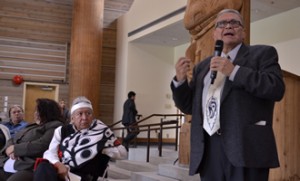The event, part of UBC’s Celebrate Learning Week, was a partnership between the UBC First Nations House of Learning, the Indian Residential School Survivors Society and the West Coast Liaison of the Truth and Reconciliation Commission of Canada.
The deeply moving speakers engaged the university’s faculty, senior leadership, and students in dialogue with residential school survivors and Aboriginal leaders to develop a better common understanding of the Indian residential schools and their effects. Speakers included Chief Bobby Joseph of the Indian Residential School Survivors Society, Commissioner Marie Wilson of the Truth and Reconciliation Commission, and Beverly Jacobs, former president of the Native Women’s Association of Canada.
On June 11, 2008, Prime Minister Stephen Harper apologized in Parliament for the government policies that resulted for more than a century in the Indian Residential School system. The system had devastating effects on First Nations and Aboriginal people in Canada, and the effects continue to this day. Children were removed, often forcibly, from their families and communities, and placed in an environment in which their culture and identity was deliberately undermined and within which they often suffered psychological, physical, and sexual abuse.
This is a part of our country’s history and society that most non-Aboriginal Canadians know very little about. Something that institutions like UBC are in a position to change.
Participants heard first hand from survivors such as Louisa Smith (Haisla) and her daughter Susan Lizotte who spoke of the trauma inflicted on innocent children who returned to their communities alienated from both mainstream and Aboriginal society, and with little experience to draw on in constructing families of their own. They heard personal stories of the tragic intergenerational effects on individuals, families, and communities that continue to this day.
Dr. Linc Kesler, Director of the First Nations House of Learning, notes that understanding these effects and this specific history is crucial to providing a more accurate and informed education for all students and maintaining a knowledge base on which society can advance.
“It is a key role we can play in effecting reconciliation between Canadian society and Aboriginal communities, and our opportunity to develop an educational system that effectively addresses the past and works towards a better future,” says Kesler.
As participants left the event through the ceremonial door, it was with a sense of hope for this better future. This gathering is an important first step in creating meaningful dialogue on these issues and over the coming years, UBC and its community partners will be working together to further this agenda and make meaningful change within the institution and in society as a whole.
Visit Indigenous Foundations for a full video archive of the event.
